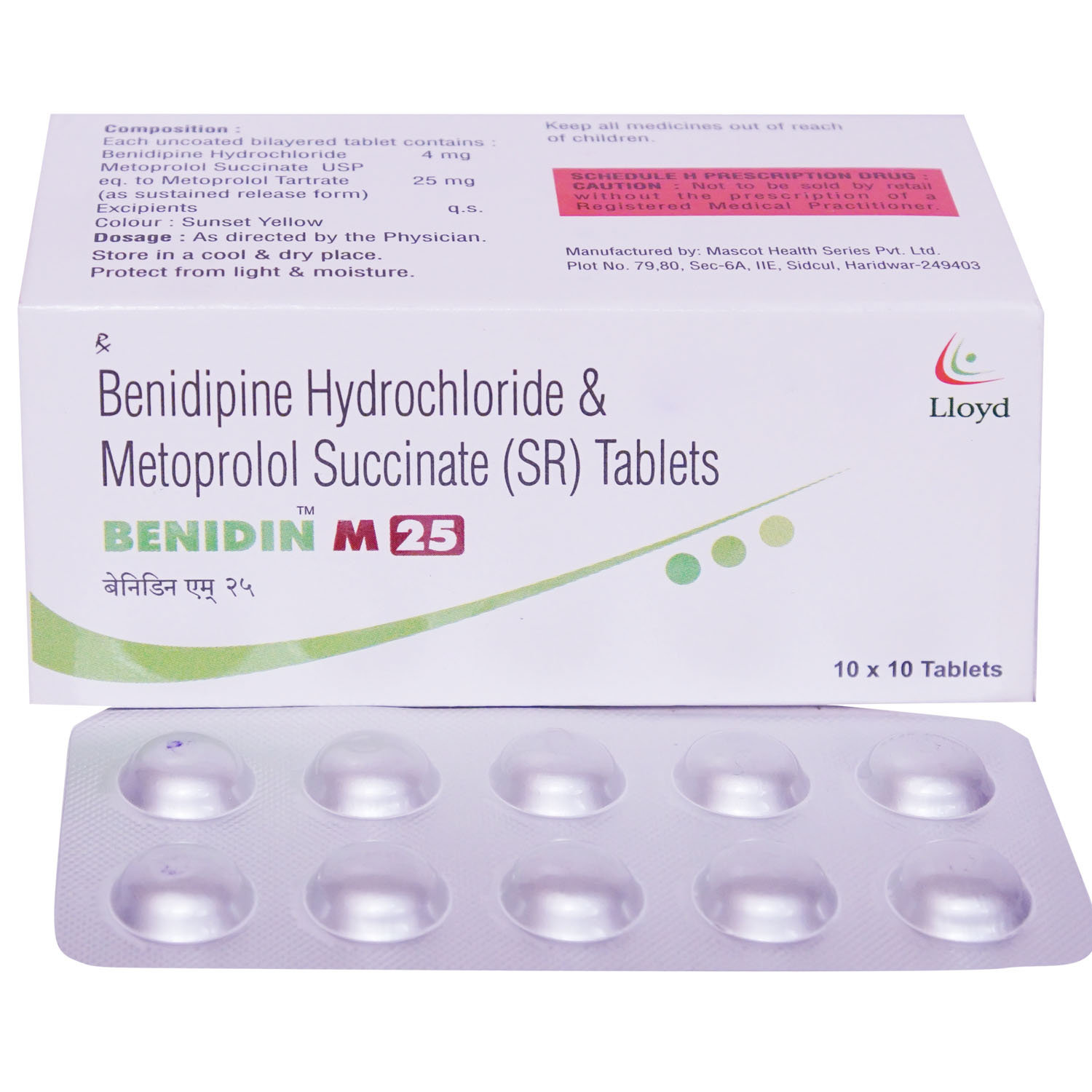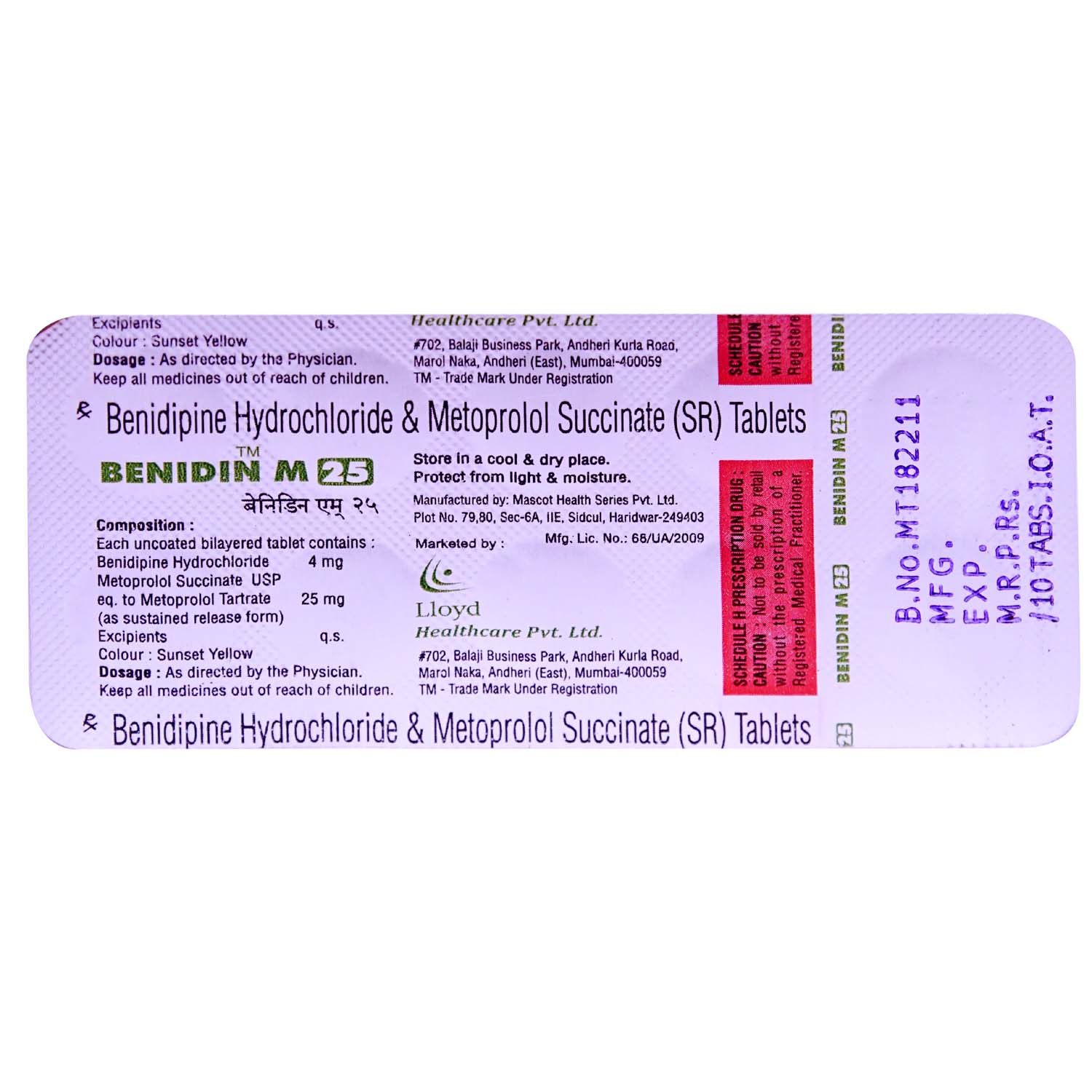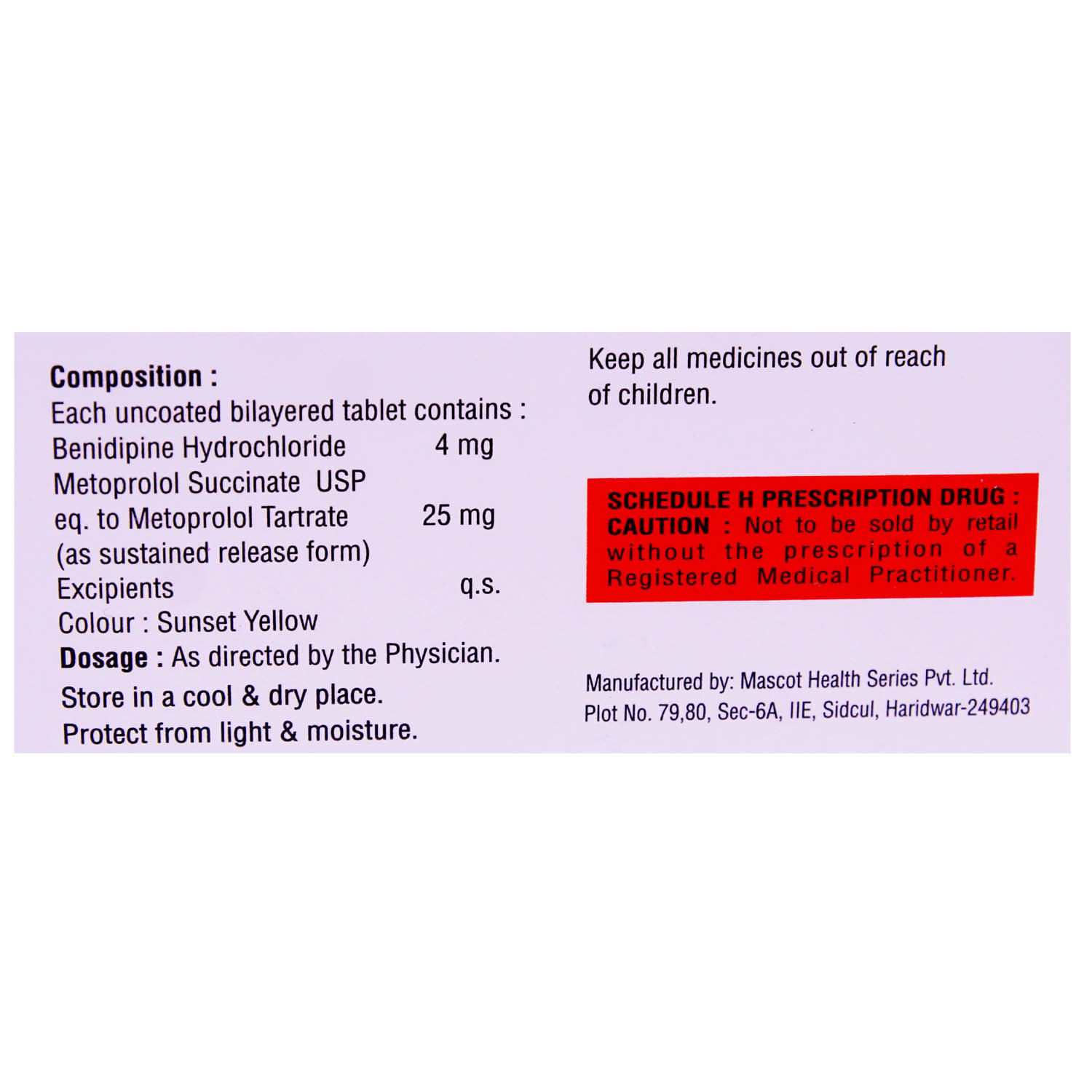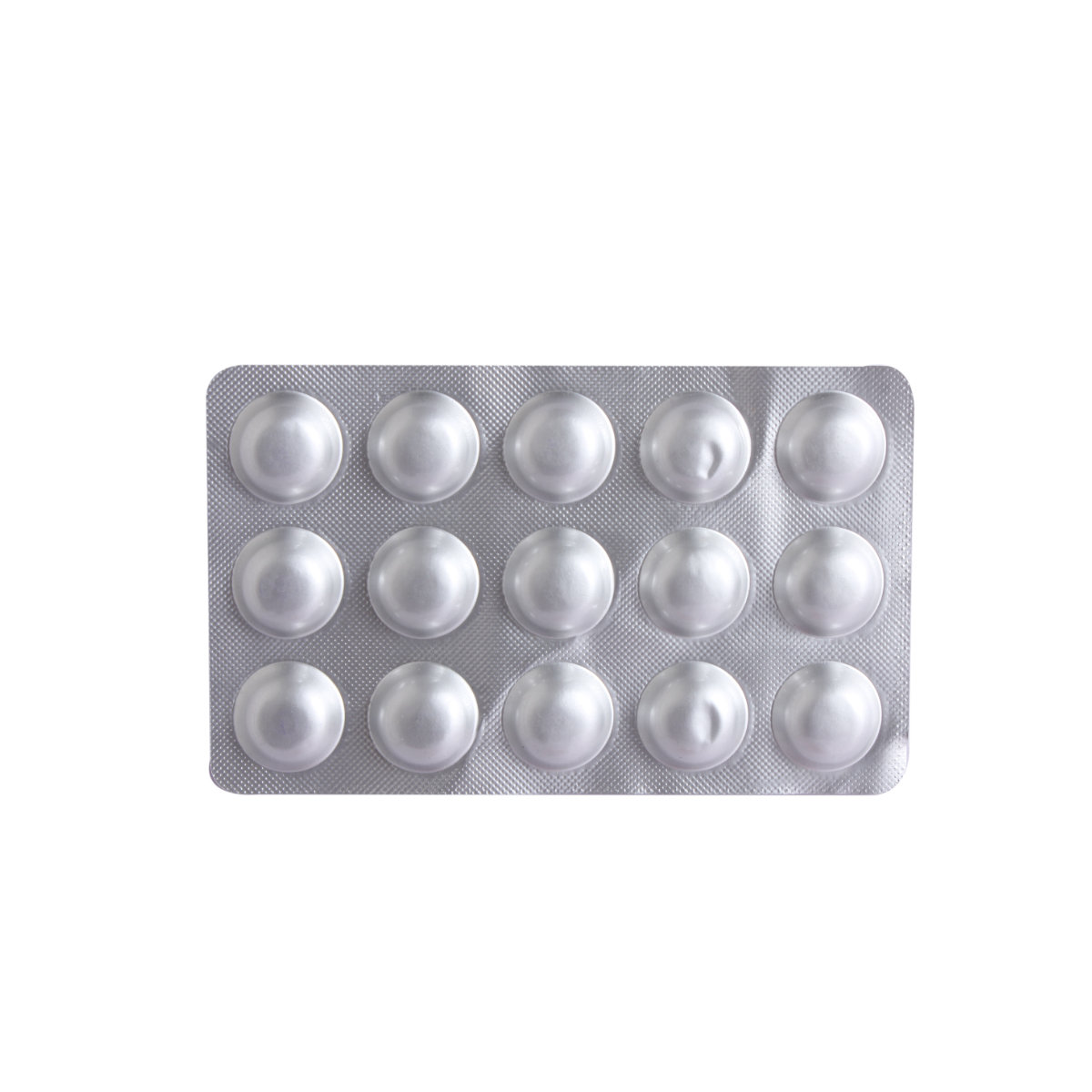Benidin M 25 Tablet 10's
MRP ₹131.5
(Inclusive of all Taxes)
₹19.7 Cashback (15%)
Selected Pack Size:10
10 ₹118.35
(₹11.84 per unit)
Out of stock
15 ₹201.2
(₹13.41 per unit)
In Stock
Provide Delivery Location
Online payment accepted
 Prescription drug
Prescription drugWhats That
Composition :
Manufacturer/Marketer :
Consume Type :
Expires on or after :
Return Policy :
About Benidin M 25 Tablet
Benidin M 25 Tablet belongs to the group of anti-hypertensive medicines used to treat high blood pressure (hypertension). Benidin M 25 Tablet helps lower the blood pressure, thereby reducing the chances of heart problems such as heart attack and stroke. High blood pressure is a condition in which the blood exerts increased pressure on the walls of blood vessels.
Benidin M 25 Tablet is a combination of two drugs, namely: Benidipine and Metoprolol. Benidipine acts on the calcium channels of the blood vessels and enlarges the coronary vessel and peripheral arteries, thereby helps blood flow smoothly. Metoprolol slows down the heart rate and makes it easier for the heart to pump blood throughout the body. Together, Benidin M 25 Tablet helps treat hypertension.
You are advised to take Benidin M 25 Tablet for as long as your doctor has prescribed it for you, depending on your medical condition. In some cases, you may experience common side effects such as headache, dizziness, tiredness, diarrhoea, and nausea. Most of these side effects do not require medical attention and will resolve gradually over time. However, you are advised to talk to your doctor if the side effects persist or worsen.
Try not to stop taking Benidin M 25 Tablet on your own, as it may cause a sudden increase in blood pressure. Consult your doctor if you are pregnant or breastfeeding. The safety of Benidin M 25 Tablet in children is unknown, so please consult your doctor if you have any concerns. Benidin M 25 Tablet may cause dizziness, so drive with caution. Avoid consuming alcohol as it might cause increased dizziness. Inform your doctor about all the medicines you are taking and your health condition to rule out any interactions.
Uses of Benidin M 25 Tablet
Directions for Use
Key Benefits
Benidin M 25 Tablet is a combination of two drugs, namely: Benidipine and Metoprolol. Benidipine acts on the calcium channels of the blood vessels and enlarges the coronary vessel and peripheral arteries, thereby helps blood flow smoothly. Metoprolol slows down the heart rate and makes it easier for the heart to pump blood throughout the body. Together, Benidin M 25 Tablet helps treat hypertension. Benidin M 25 Tablet helps lower blood pressure, thereby reducing the chances of heart problems such as heart attack and stroke. Benidin M 25 Tablet may also be used to treat angina pectoris.
Storage
- If you experience low blood pressure symptoms like dizziness, lightheadedness, or fainting while taking medication, seek immediate medical attention.
- Make lifestyle modifications and adjust your medication regimen under medical guidance to manage low blood pressure.
- As your doctor advises, regularly check your blood pressure at home. Record your readings to detect any changes and share them with your doctor.
- Fluid intake plays a vital role in managing blood pressure by maintaining blood volume, regulating blood pressure, and supporting blood vessel function. Drinking enough fluids helps prevent dehydration, maintain electrolyte balance, and regulate fluid balance.
- Take regular breaks to sit or lie down if you need to stand for long periods.
- When lying down, elevate your head with extra pillows to help improve blood flow.
- Avoid heavy exercise or strenuous activities that can worsen low blood pressure.
- Wear compression socks as your doctor advises to enhance blood flow, reduce oedema, and control blood pressure.
- If symptoms persist or worsen, or if you have concerns about your condition, seek medical attention for personalized guidance and care.
- Exercising regularly helps lower the risk of heart problems.
- Maintain a healthy diet, including vegetables and fruits.
- Rest well; get enough sleep.
- Manage stress with yoga and meditation.
- Limit alcohol and smoking.
- Rest well; get enough sleep.
- Eat a balanced diet and drink enough water.
- Manage stress with yoga and meditation.
- Limit alcohol and caffeine.
- Physical activities like walking or jogging might help boost energy and make you feel less tired.
- Tell your doctor immediately if you experience shortness of breath after taking medication.
- Your doctor may adjust the medication regimen or dosage or give alternative medical procedures to minimize the symptoms of shortness of breath.
- Monitor your oxygen levels and breathing rate regularly to track changes and potential side effects.
- For controlling stress and anxiety, try relaxation techniques like deep breathing exercises, meditation, or yoga.
- Make lifestyle changes, such as quitting smoking, exercising regularly, and maintaining a healthy weight.
- Seek emergency medical attention if you experience severe shortness of breath, chest pain, or difficulty speaking.
- Follow up regularly with your doctor to monitor progress, adjust treatment plans, and address any concerns or questions.
- Eat potassium-rich foods like avocados, bananas, spinach, and potatoes.
- Stay hydrated by drinking plenty of water.
- Exercise regularly and maintain healthy weight.
- Manage stress.
- Prioritize 7-9 hours of sleep each night to help your body and mind recharge.
- Avoid smoking and limit intake of caffeine.
- Practice stress-reducing activities like meditation, yoga, or deep breathing to help calm your mind and body.
- Avoid stimulants and illegal drugs.
- Call your doctor if it worsens.
- Always wear loose-fitting clothes which are suitable for your activity.
- Include the diet containing fruits like watermelon, grapes, bananas and green leafy vegetables.
- Drink plenty of water stay hydrated.
- Avoid moving more and staying in hot sun.
- Reducing the amount of time you spend outside and indoors in the cold.
- keeping your hands warm by donning mittens, gloves, or other protective clothing.
- Observing a skincare regimen that safeguards your fingers and hands.
- To improve circulation, give your hands and feet a little massage.
Drug Warnings
Do not take Benidin M 25 Tablet if you are allergic to any of its contents. Inform your doctor if you have diabetes, circulation problems, asthma, COPD, congestive heart failure, thyroid disorder, adrenal gland tumour, heart, kidney, or liver problems; or if you are on a low-salt diet. Consult your doctor if you are pregnant or breastfeeding. Benidin M 25 Tablet may cause dizziness, so drive with caution. Avoid consuming alcohol as it might cause increased dizziness. Rise slowly from lying/sitting position as Benidin M 25 Tablet may cause dizziness (orthostatic hypotension).
Drug-Drug Interactions
Drug-Drug Interactions
Login/Sign Up
Taking ceritinib together with Benidin M 25 Tablet can slow your heart rate and increase the risk of an irregular heart rhythm.
How to manage the interaction:
Although there is a interaction between Benidin M 25 Tablet and Ceritinib, but they can be taken together if your doctor has prescribed them. However, consult your doctor immediately if you experience any dizziness, lightheadedness, fainting, or irregular heartbeat. Do not discontinue any medications without consulting a doctor.
Coadministration of Benidin M 25 Tablet with Verapamil may lead to increased side effects.
How to manage the interaction:
Although there may be an interaction, Benidin M 25 Tablet can be taken with Verapamil if prescribed by the doctor. Consult a prescriber if you experience fatigue, headache, fainting, swelling of the extremities, weight gain, shortness of breath, chest pain, increased or decreased heartbeat, or irregular heartbeat. Do not discontinue any medications without a doctor's advice.
Coadministration of Aminophylline with Benidin M 25 Tablet together can make Benidin M 25 Tablet less effective and increase the effects of aminophylline.
How to manage the interaction:
Taking Aminophylline with Benidin M 25 Tablet may lead to an interaction, it can be taken only if a doctor has advised it. If you experience nausea, vomiting, sleeplessness, restlessness, irregular heartbeats, or difficulty in breathing, contact a doctor immediately. Do not discontinue any medications without consulting a doctor.
Coadministration of Acebutolol with Benidin M 25 Tablet can cause abnormal heart rhythm.
How to manage the interaction:
Taking Benidin M 25 Tablet and Acebutolol together can possibly result in an interaction, it can be taken if your doctor has advised it. However, if you experience blurry vision, confusion, dizziness, fainting, lightheadedness, nausea or vomiting, contact your doctor immediately. Do not discontinue any medications without consulting a doctor.
Co-administration of Clonidine and Benidin M 25 Tablet may lower blood pressure and slow the heart rate.
How to manage the interaction:
Although there is a possible interaction between Clonidine and Benidin M 25 Tablet, you can take these medicines together if prescribed by your doctor. However, if you experience headaches, slow heartbeat, dizziness, or feeling like you might pass out, contact your doctor. Do not stop using any medications without first talking to your doctor.
Coadministration of Benidin M 25 Tablet and Tizanidine may reduce the efficiency of Benidin M 25 Tablet.
How to manage the interaction:
Taking Benidin M 25 Tablet and Tizanidine together can possibly result in an interaction, it can be taken if your doctor has advised it. However, if you experience blurry vision, confusion, dizziness, fainting, lightheadedness, nausea or vomiting, contact your doctor immediately. do not discontinue any medications without talking to your doctor.
Using Benidin M 25 Tablet and Saquinavir can increase the risk of an irregular heart rhythm.
How to manage the interaction:
There may be a possible interaction between Benidin M 25 Tablet and Saquinavir, but they can be taken together if your doctor has prescribed them. However, consult a doctor immediately if you experience dizziness, lightheadedness, fainting, slow pulse, or irregular heartbeat. Do not discontinue any medications without consulting a doctor.
Both Benidin M 25 Tablet and Artemether may increase the blood levels and effects of Benidin M 25 Tablet activity.
How to manage the interaction:
Taking Benidin M 25 Tablet and Artemether together can possibly result in an interaction, it can be taken if your doctor has advised it. However, if you experience blurry vision, confusion, dizziness, fainting, lightheadedness, nausea or vomiting, contact a doctor immediately. Do not discontinue any medications without consulting a doctor.
Use of Benidin M 25 Tablet with Atazanavir may increase the risk of an irregular heart rhythm.
How to manage the interaction:
Although there may be an interaction between Benidin M 25 Tablet and Atazanavir, it can be taken if prescribed by the doctor. Consult the doctor if you experience dizziness, lightheadedness, fainting, or irregular heartbeat, contact your doctor immediately. Do not discontinue any medications without consulting a doctor.
Coadministration of Benidin M 25 Tablet with Diltiazem can increase the side effects.
How to manage the interaction:
Although there is a possible interaction between Benidin M 25 Tablet and Diltiazem, you can take these medicines together if prescribed by your doctor. Consult your doctor immediately if you experience fatigue, headache, fainting, swelling of the extremities, weight gain, shortness of breath, chest pain, increased or decreased heartbeat, or irregular heartbeat. Do not discontinue any medications without consulting a doctor.
Drug-Food Interactions
Drug-Food Interactions
Login/Sign Up
Diet & Lifestyle Advise
- You are advised to consume low salt and low-fat diet.
- Regular exercise is also recommended.
- Eat a diet rich in whole grains, vegetables, and fruits.
- Avoid smoking and alcohol consumption.
- Maintain a healthy weight with proper diet and exercise.
- Manage stress with meditation and yoga.
Side Effects of Benidin M 25 Tablet
- Headache
- Dizziness
- Tiredness
- Diarrhoea
- Nausea
Habit Forming
Therapeutic Class
All Substitutes & Brand Comparisons
RX
Benitowa-Beta 25 Tablet 15's
Akumentis Healthcare Ltd
₹223.5
(₹13.41 per unit)
13% COSTLIERRX
Benidin M 25 mg Tablet 15's
Lloyd Healthcare Pvt Ltd
₹223.5
(₹13.41 per unit)
13% COSTLIERRX
Benitowa Beta 25 mg Tablet 10's
Akumentis Healthcare Ltd
₹159
(₹14.31 per unit)
20% COSTLIER
Author Details
We provide you with authentic, trustworthy and relevant information
Drug-Diseases Interactions
Drug-Diseases Interactions
Login/Sign Up
FAQs
Drug-Drug Interactions Checker List
- ASPIRIN
- DULOXETINE
- ALPRAZOLAM
- INSULIN GLARGINE
- FUROSEMIDE
- LEVOTHYROXINE
Special Advise
- Regular monitoring of blood pressure levels, kidney/liver function and electrolyte levels while taking Benidin M 25 Tablet is advised.
- If you are due to undergo any tests or surgery, inform your doctor that you are taking Benidin M 25 Tablet .
Disease/Condition Glossary
High blood pressure (hypertension): It is a condition in which the blood exerts increased pressure on the walls of blood vessels leading to hypertension. This condition can lead to hardened arteries (blood vessels), decreasing the blood and oxygen flow to the heart. Raised blood pressure can cause chest pain (angina) and heart attack (when the blood supply to the heart is blocked). High blood pressure also causes brain damage (stroke) and kidney failure. Symptoms of high blood pressure include headache, dizziness, nose bleed, changes in vision, chest pain, weakness and dyspnoea (shortness of breath). However, most of the time, the signs and symptoms of hypertension are none.

Have a query?
Alcohol
Safe if prescribed
Avoid consuming alcohol as it might cause increased dizziness.
Pregnancy
Consult your doctor
Please consult your doctor if you are pregnant; your doctor will prescribe only if the benefits outweigh the risks.
Breast Feeding
Consult your doctor
Please consult your doctor; your doctor will decide whether Benidin M 25 Tablet can be taken by breastfeeding mothers or not.
Driving
Safe if prescribed
Benidin M 25 Tablet may cause dizziness, do not drive or operate heavy machinery if you feel dizzy.
Liver
Consult your doctor
Dose adjustment may be needed. Benidin M 25 Tablet should be used with caution in patients with liver impairment/liver disease. Please consult your doctor if you have liver problems or any concerns regarding this.
Kidney
Consult your doctor
Dose adjustment may be needed. Benidin M 25 Tablet should be used with caution in patients with kidney impairment/kidney disease. Please consult your doctor if you have kidney problems or any concerns regarding this.
Children
Safe if prescribed
Limited information is available. Please consult your doctor if you have any concerns regarding the usage of Benidin M 25 Tablet in children.












_0.jpg?tr=q-85)

